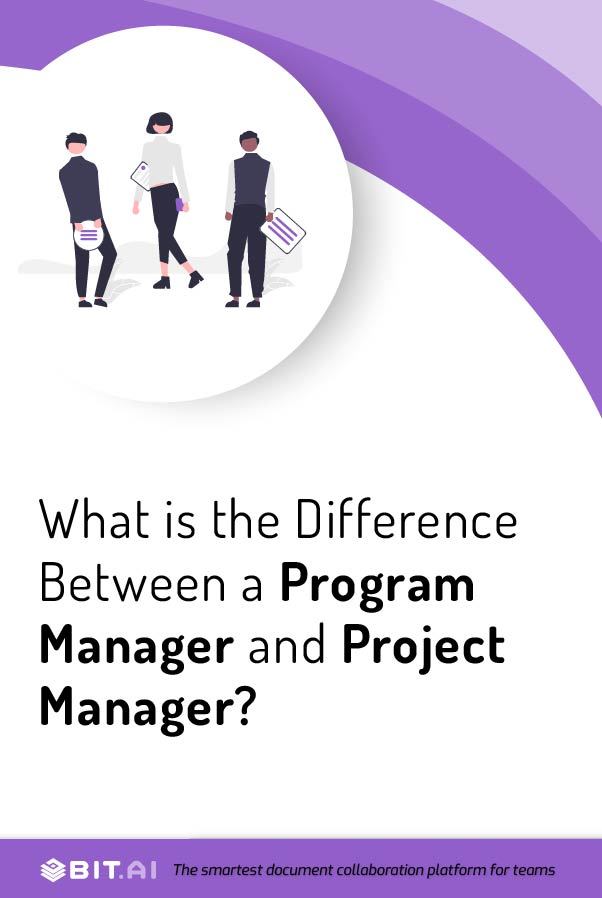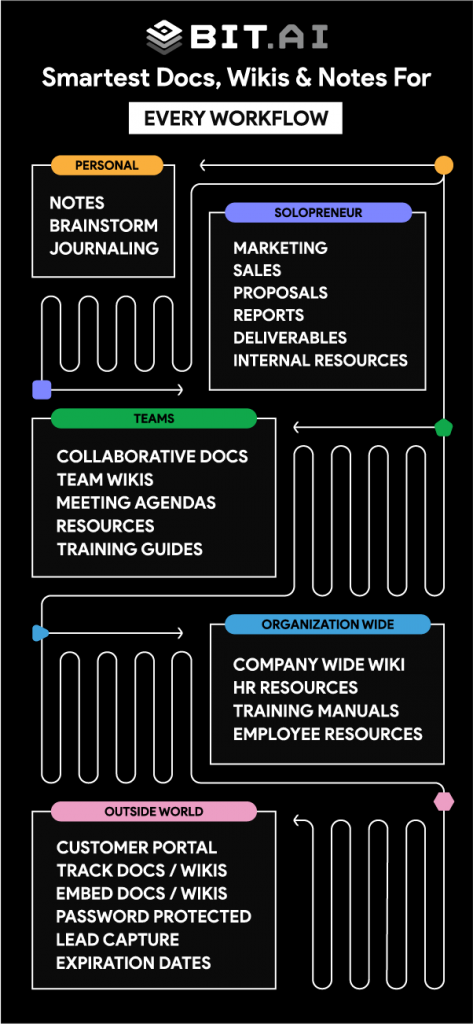At the heart of most business endeavors lie projects and programs. Any company or organization functions on a day-to-day basis by trying to achieve a specific goal. These goals are set in the form of a project – one after another. The amalgamation of projects constitutes, what can be called a program.
So how do both these concepts work? Well, behind the success of every project is a project manager who oversees the entire process with a dedicated team to ensure that certain goals are met. Meanwhile, a program manager is one who networks and navigates a plethora of projects.
So, a project manager and a program manager, at first glance, might seem to be synonymous in nature, one might even think that such similar-sounding titles cannot be so vastly different. But the roles they play and the extent of their work vary quite a bit.
In this blog, we will help you understand the distinction between the two by explaining their roles, key differences, skills required, and examples! Let’s get started!
Program Manager vs Project Manager: What Do They Do?
One might say that program and project managers are like two sides of the same coin, yet you should not ignore their fundamental differences. To know the core differences, you have to understand what they are and what they do.
Program Manager
A program manager on the other hand is a person who oversees many individual projects that all contribute to the realization of a long-term goal or outcome. They play a visionary role because their job entails looking after a range of projects that build on top of one another resulting in organizational growth.
Not only are they in charge of overseeing the operational process of all the projects, they must see to it that each project is not just executed in a stipulated time, but adds value to the bigger picture by making distinct contributions. This is why their role entails them to be visionary in their skillset.
They must assess the plans made, places that need correction and adjustment, potential obstacles along the way as well as the chances of success and failure. As each goal achieved or target not met impacts the company or organization, program managers have a lot on their plate.
Program managers handle a whole lot of work and it includes:
- Collaborating and working with project managers about the scheduling, planning, budget estimate, and everything else in between for the completion of projects.
- Performing the job of maintaining simultaneous projects and ensuring that each one is a step towards realizing the company’s goals.
- Facilitating open and honest communication amongst all fronts without which smooth operation is impossible.

Project Manager
A project manager is a person who handles individual projects that in the grand scheme of things contribute to the goals of programs. The duration of the projects that project managers handle is usually short and specific i.e., with properly defined objectives. They have stipulated deadlines that must be met in order to keep the entire momentum moving forward.
Apart from being responsible for managing the teams to which they are assigned, project managers must oversee that the project is properly executed on time. So, they have to be strategic in what they do. Also, an integral function performed by project managers is that they give periodic reports and updates to program managers about the progress of such projects.
The extent of work that project managers have to handle includes the following:
- Acquiring resources for the project encompasses tools, budgets, and even human resources.
- Maintain effective communication between team members as well as with the program manager and give regular and timely updates.
- Ensuring that the project is progressing positively and addressing obstacles that arise during the process.
 Now that you have an idea of what program managers and project managers are and what they do, you’ve already grasped that they are quite different. But what are the distinct key differences? Let’s find out!
Now that you have an idea of what program managers and project managers are and what they do, you’ve already grasped that they are quite different. But what are the distinct key differences? Let’s find out!
Key Differences Between Program Manager Vs Project Manager
1. Nomenclature
Even just by their names, you can make a distinction. A project refers to a temporary endeavor with specified objectives and a target goal, while a program encompasses many such projects which are linked and have combined benefits.
2. Main Focus
The main focus of a project manager is on the content as they work within a deadline for a specific goal. For a program manager, the focus is on context because the job entails supervising many projects at a time and gearing them toward beneficial goals.
3. Duration
Another fundamental difference between a project manager and a program manager is the duration of their work. As project managers are usually assigned to handle one project, their job is done after the execution of the specified goal. Whereas a program manager has to oversee the entire organizational processes, including the numerous projects undertaken. Thus, the duration of their work is lengthy.
4. Nature of tasks
The tasks handled by project managers are technical in nature while the tasks that program managers work on are strategic in nature.
5. Functional Units
As a project manager is assigned to a specific project, their area of operation is limited to a single unit. Whereas for a program manager, the scope is much larger and they handle multiple functional units.
6. Areas of Concern
A project is undertaken with a specific end goal in mind and therefore the area of concern for a project manager is to attain such goals and deliver results. A program manager on the other hand is concerned with receiving such goals or results attained by project managers.
7. Production
A project manager focuses on producing an output while a project manager works toward an outcome.
8. Measurability
A project manager’s success can be measured in terms of customer satisfaction, cost-effectiveness, quality of product, etc., while a program manager’s success is measured in terms of whether the program meets the objectives it set out to attain.
Skills Required For a Program Manager vs Project Manager
Knowing what skills are needed for both roles will provide a clear picture. Here are the essential skills needed to be either a program manager or a project manager:
Skills Required for a Program Manager
In order to effectively and efficiently lead program initiatives, a person has to cultivate the following skills:
1. Resource Management
To handle programs made up of several projects that mostly operate simultaneously, you must be able to quickly identify and allocate resources if you want to be a good program manager. This includes formulating contingency plans and crafting plans that can address potential risks that may arise.
In certain probable cases such as a sudden surge in material prices or suppliers pulling out unexpectedly, a project manager should always have a Resource Management Plan ready. Such a plan should mitigate the problems at hand and keep operations sailing forward.
Read More: Best Resource Management Tools and Software!
2. Equipped with Tools and Techniques
A program manager needs to be equipped with the knowledge of certain tools and techniques while managing a program cycle. These include:
- Monitoring Change: This means the ability to manage people through a change initiative.
- Milestone Mapping: A program manager must be able to identify certain milestones in the course of a program cycle to indicate that things are moving according to schedule.
- Process Planning: As the job of a program manager entails overseeing many projects at a time, being able to properly define the sequence of events and the steps needed to be taken is a must.
3. Negotiation Skills

Having the vision of how to develop a program initiative is the easy part, getting your program approved and up and running is a whole other ball game. This is why program managers must possess exceptional negotiation skills in order to sell their vision to clients as well as to the administration at large.
4. Analytical Skills
A program is an amalgamation of the output of many projects together. Therefore, huge quantities of data are generated. A program manager must be able to collect and integrate statistical, financial, and other information efficiently in order for any program to be properly executed. So analytical skills are vital.
Skills Required for a Project Manager
To be a great project manager, a person must possess the skills mentioned below:
1. Leadership Skills
For a project to run smoothly, all aspects must work cohesively. This requires a good leader to be in charge of the people working on the project. A leader’s job entails not only supervision and guidance, but also being able to identify everyone’s strengths and weaknesses so that they can be assigned to specific tasks and maximum productivity is attained.
2. Communication Skills
A project is a team effort and in order for a team to work efficiently together, everyone must be on the same page. This is why communication is key. A project manager must be able to facilitate communication between team members to build camaraderie so that collaborative relationships are built.
Read More: Project Management Communication Plan: Definition & Steps to Create!
3. Risk Management
Any project is bound to be met with obstacles. In such instances, to keep everything moving ahead despite challenges, project managers must possess the skill of risk management. A leader with this skill can help overcome the many challenges that can potentially derail projects.
4. Organizational Skills
This is a no-brainer. Every project requires multifaceted planning, so a project manager has to have superior organizational skills to help with duration and budgetary estimates, progress tracking, documentation of milestones, and coordination of team members.
By now you have an acute understanding of what both program managers and project managers do and what their job entails. But if you’re a little lost as to what positions can be held in various fields, read the examples mentioned in the next section.
Examples of Program Manager Vs Project Manager Positions
Program Manager Position Examples
If you happen to be in search of program management positions, you can dip your toes in the following fields:
1. As an HR Manager
A human resource manager develops specifications for job classifications, designs and revises training programs as well as formulates human resource policies and procedures.
2. As an IT Program Manager
An IT program manager sounds like a daunting position, but their major role is to address IT issues across departments. Their responsibilities include giving expert advice on procedures and policies related to IT management, assessing IT operations to identify requirements, and supervising those at the top in integrating necessary applications
Project Manager Position Examples
If you feel more inclined towards the position of a project manager, you might be able to play an important role in business performance and success. You can try out the following:
1. A Software Development Project Manager
This is in the field of IT and this managerial position includes organizing and overseeing software projects by allocation of funds, planning parameters to be followed, and managing the entire development process.
2. Technical Project Managers
The job of a technical project manager includes finding solutions for technical issues, measuring the potential of risks within projects, management of resources in the form of purchasing materials required and negotiating the best prices for them, as well as devising project plans that align with company goals.
Wrap Up
Now you are well-versed with at least a basic understanding of what project managers and program managers are, what they do, and the key differences which sets them apart.
It’s important to note that a project manager and a program manager play substantial roles in their respective positions and that you should assess what will work best for you. Good luck!
Further Reads:
10 Best Productivity Hacks to Lead a Better Life!
Top 9 HR Software and Tools for Human Resource Departments!
Resource Leveling – Everything You Need To Know About It!
Burn-Up Charts: What are they and How to Create One?
Project Timeline: What is it & How to Create it? (Step By Step)
11 Agile Project Management Tools You Should Use
Sales Manager Job Description: How to Write it?

Related posts
Bit.ai | Watch to Learn More
What is Bit.ai?
Bit.ai is an innovative AI-driven knowledge and Document Managment suite designed to empower knowledge workers by streamlining the creation of, documents, wikis, and notes. With an intuitive interface and seamless integration, Bit.ai acts as a versatile assistant to help you collaborate, generate, organize, and visualize your ideas effortlessly. Whether you are drafting a report, managing a project, collaborating with your team or clients, or brainstorming new concepts, Bit.ai brings intelligence and creativity to every aspect of your work process.


